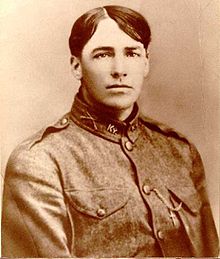- Newton Jasper Wilburn
-
Captain Newton Jasper Wilburn (November 9, 1874–January 31, 1927) was a Kentucky National Guard officer who played a crucial part in ending the Black Patch Tobacco Wars, the most sustained and violent civil uprising in America since the Civil War.
Contents
The Capture of Frank Ball
Born in Pineville, Bell County, Kentucky, Wilburn came to prominence as a National Guard officer after having served two enlistments in the United States Army infantry in the 1890s.[1] In 1906, before his involvement in the Black Patch Tobacco Wars, then Lieutenant Wilburn arrested a notorious criminal Frank Ball. He led a detachment on horseback into Virginia to hunt down Ball after he escaped from prison.here he was serving a life sentence. The chase ended with a dramatic shootout at Rufus Ball’s farm in which he “fired the first shot."[2] In the end, the troopers captured Ball and killed one of his men. A local newspaper proclaimed, “The capture of Frank Ball was a thrilling chapter in the criminal history of the Virginia Mountains.” [3]
The Black Patch Tobacco Wars
In 1907 and 1908, a vigilante group known as The Night Riders terrorized the "Black Patch" region of Kentucky and Tennessee. Initially formed as a response to the James B. Duke tobacco conglomerate (ATC), the Night Riders whipped disloyal members, murdered opponents, burned buildings, and seized entire towns. In 1908, the New York Times reported, “There now exists in the State of Kentucky a condition of affairs without parallel in the history of the world." [4] Once again, Lieut. Wilburn was called upon to lead soldiers on horseback through the countryside.
During the spring of 1908, by then a resident of Sturgis, Union County, Kentucky, Lieut. Wilburn and his men made a series of crucial arrests and protected numerous key informants.[5] He also enlisted former Night Riders into his unit, including Macon Champion, an experienced mounted man that had implicated fifteen other farmers.[6] These actions effectively ended the state of anarchy in the Black Patch region and Lieut. N.J. Wilburn was promoted to the rank of Captain.
The battle against Duke then moved to the more appropriate arena, the courts. On May 9, 1911 the US Supreme Court ruled that the Duke trust, ATC, was a monopoly and in violation of the Sherman Anti-Trust Act of 1890. 5. 221 U.S. 106 (1911).[7]
Later career
After the Black Patch Tobacco Wars, Capt. N.J. Wilburn was presented his bride-to-be, Lula Wren, in a dramatic scene on the train station platform in Springfield, TN.[8] It was perhaps a fitting and symbolic end to the turmoil. Capt. N.J. Wilburn was highly regarded in the region and remembered as one of the bravest soldiers serving during the Black Patch Tobacco Wars.[9] He went on to serve at several important administrative posts in the area until his untimely death in 1927.
Wilburn came from a military family. Both his grandfather, Reuben Wilburn, and father, Lewis Wilburn, fought for the Union during the Civil War despite the region's strong Confederate sympathy. Reuben Wilburn enlisted in the Infantry at age sixty. Newton Jasper’s own sons served in World War II, his grandsons served in Vietnam, and his great-grandsons have served in the Persian Gulf, Iraq, and Afghanistan.
References
- ^ http://freepages.genealogy.rootsweb.ancestry.com/~deboyer39/lewis_wilburn/pafg03.htm
- ^ "Frank Ball Captured" The Big Stone Gap Post 16 AUG 1906
- ^ "Frank Ball Captured" The Big Stone Gap Post 16 AUG 1906
- ^ Vivian, H.A. “How Crime Is Breeding Crime in Kentucky.” New York Times, 26 JUL 1908
- ^ “Secretary's Books to be Turned over by Night Rider Leader,” Hopkinsville Kentuckian, 18 APR 1908
- ^ “Champion Enlists,” Hopkinsville Kentuckian, 16 APR 1908
- ^ http://en.wikipedia.org/wiki/United_States_v._American_Tobacco_Co
- ^ “A Soldier's Romance,” Trenton Gazette, SEP 1909
- ^ “A Soldier's Romance,” Trenton Gazette, SEP 1909
Categories:- American military personnel of the Spanish–American War
- 1927 deaths
- 1874 births
Wikimedia Foundation. 2010.

